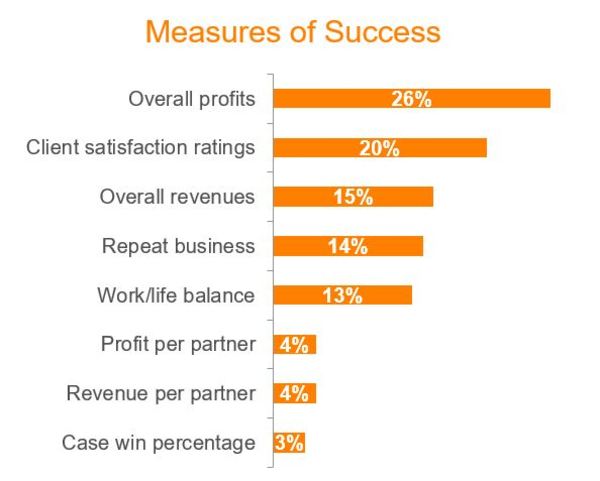How do you measure success for your solo law firm? As it turns out, that depends largely on how you define the term “success.”
Before measuring your own firm’s success let’s first take a look at how other solo and small first gauge success for their practices.
Above the Law recently published an interesting article about a variety of perceptions solo and small law firms have of law office success. Based on the results of a recent survey of solo and small law firm management conducted by the Thomson Reuters Solo and Small Law Firm group, the article reports that the top four factors by which lawyers measure law practice success overall are:
- client satisfaction ratings
- repeat business
- overall profits
- work/life balance
When asked to identify the one factor that is the primary measure of success, the most highly rated is overall profits, client satisfaction ratings and overall revenues. Check out the graph below for a breakdown by category of factors identified as the primary measure of law office success:
However, when survey respondents were separated into either solo or small law firms, the top factor for success differed between the two. Solo firms tended to rate client satisfaction as their biggest measure of success, while small law firms ranked profit as the main indicator of success.
Regardless of the standard by which they measured success, an encouraging 85 percent of respondents did consider themselves to be successful. That is good news, especially since the legal industry holds a repetition of being skeptical or pessimistic.
How Do YOU Define and Measure Success?
Of the categories listed above, which do you choose as the success indicator that matters most? The future of your practice depends upon the answer you choose. Regardless of the value you place on each of the success factors mentioned, to measure your success, you must define your goals and track your results.
For instance, if you choose client satisfaction as the way you define success, what are you doing to ensure that client satisfaction levels are high? What specific goals are you setting regarding client satisfaction? How are you measuring client satisfaction? Are you taking surveys, asking for client feedback, or are you just guessing? Poorly defined goals lead to barely recognizable results.
Suppose you choose overall profits as the way you define success. Profits are easy enough to measure, but you still have to create specific goals to get great results. If you aim at nothing, you will hit it every time.
What are some short-term goals that could lead you to the larger overall goal of increased profitability? Here are a few you might consider:
- Could you add another practice area to your client offerings?
- Could you manage expenses and overhead more effectively by adopting new technologies and methodologies for your firm?
- Could you improve your attorney marketing strategies to attract more profitable business to your door?
Once you have clearly defined your goals you must regularly measure the results and make adjustments. And remember, your results don’t depend on what other firms are doing. Rather, you measure your results and your progress toward your goal achievement.
Measurement leads to achievement, setting your law firm up for sustainable growth and setting you up for greater success, no matter how you define that term.
As Earl Nightingale, sometimes referred to as “the Dean of Personal Development,” once said, “People with goals succeed because they know where they’re going.”



